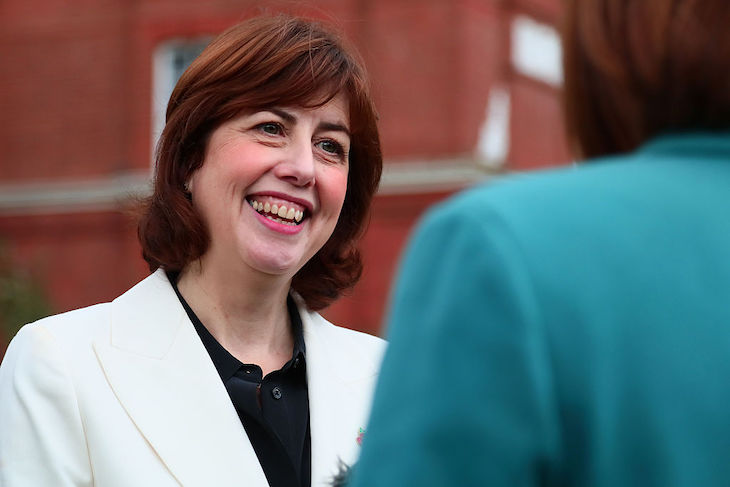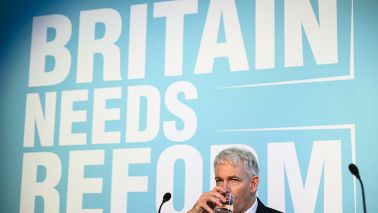In close to 30 years in political broadcasting, I’ve never had the faintest idea of what was coming around the corner. I might have guessed whatever it was would probably be bad, but that’s about it. Apart from once, in Brighton, at the Labour party conference in 2005.
Tony Blair, still then master of all he surveyed, was delivering his leader’s speech. His theme was familiar – Labour values of solidarity and social justice in a changing world – and about halfway through, he turned to globalisation. Blair could be very persuasive, but on this occasion, he was blunt.
‘I hear people say we have to stop and debate globalisation,’ he said. ‘You might as well debate whether autumn should follow summer. They’re not debating it in China and India.’
There was an unmistakable irritation, impatience and intent in the line and its delivery. He was saying: this thing – globalisation – is coming and will change your life and we can do nothing about it. I may be your leader but I can’t ameliorate its impact. And no, I don’t want to know your opinion on it if you don’t mind. They aren’t worried about opinions in Beijing.
I’d like to claim I had premonitions then of what would follow from this high-handed ‘no debate’ approach, but my internal response was more prosaic. ‘That’s going to bite him on the arse,’ I thought. It seemed particularly peculiar to me that a ‘progressive’ politician was ruling out any engagement with the question when the bedrock of Labour support were those most likely to feel the downside of insecure work and low wages.
It wasn’t just Blair. In the United States, Bill Clinton pushed through Nafta, and jobs were lost; Barack Obama stuck with TPP, and both Democrats were seen to have sided with corporate America against ordinary workers at a significant political cost. The winning acronym? MAGA.
On globalisation, people demanded a debate even though Blair had told them it wasn’t worth having. And when it came, it turned out that nothing was inevitable after all: not free trade, membership of superstates or free movement of people.
But globalisation is small potatoes compared with artificial intelligence, where a lack of debate will have even more severe consequences. McKinsey expects 375 million jobs to be lost globally by 2030 and Goldman Sachs think Europe and the US will account 300 million of them. And that’s not all; back in 2023 Rishi Sunak – remember him? – hosted a summit on AI security in the wake of warnings from some of its founding fathers about the potential of the technology to wreak havoc either in the hands of an aggressor or when the AI itself surpasses human intelligence (a day rapidly approaching) and becomes a threat to humanity.
No wonder the government’s own research reveals just how concerned people are. Asked to react to the word AI, the most common responses are: ‘robot’, ‘scary’, ‘worried’, and ‘unsure’. These are rational responses to a complex and unpredictable technology. But instead of recognising this, there are echoes of that 2005 premonition in the air whenever I hear Labour talk about AI.
The Cabinet minister responsible, Peter Kyle always makes a point of the urgency of getting on with it – ‘we are in a race, let’s not kid ourselves’ – and emphasises that the change coming is inevitable. His interviews resemble motivational pep talks more than any sort of serious grappling with the implications of such enormous change as it appears to an ordinary citizen. Those concerns about job losses and security don’t really feature. Like Blair, his message is clear: get on board, you’ve got no choice.
We do have choices to make about how we approach AI
But we do have choices to make about how we approach AI and that’s where things get really rotten. The Labour government has subcontracted its position – on how we balance safety concerns with maximising profits and how much regulation is required – to J. D. Vance. The Vice-President is not subtle. He told the Paris AI Summit that lucrative partnerships with the US would require an approach to ‘this new frontier with optimism rather than trepidation’. Kyle certainly does optimistic, and what looks like obedience too: the UK joined the US as the only two countries who refused to sign up to the Summit’s declaration calling for AI that is ‘open, inclusive, transparent, ethical, safe, secure and trustworthy’.
On AI and, alongside it, the Online Safety Bill and the Digital Services Tax, it seems Labour have thrown their lot in with the White House. It is the price that must be paid for the trade agreement they hope to strike with Trump. A real debate about the wisdom of this puts that prize in jeopardy. Kyle has already come a cropper over his plan to grant tech companies access to copyrighted material unless copyright holders opt out. The policy – part of a ‘consultation’ but one which clearly expresses a government preference for the most tech-friendly option – alienated a supergroup’s worth of national treasures, including Sir Elton John, Sir Paul McCartney and Kate Bush. The only consolation for Kyle is that he’s unlikely to get in trouble for accepting any freebie concert tickets any time soon.
If, when the reality of the change that the AI revolution brings is felt in terms of real lives and real livelihoods, the public feel sold out by politicians who made long-term decisions in service of short-term interests, they can expect more than just a bite on the arse.







Comments